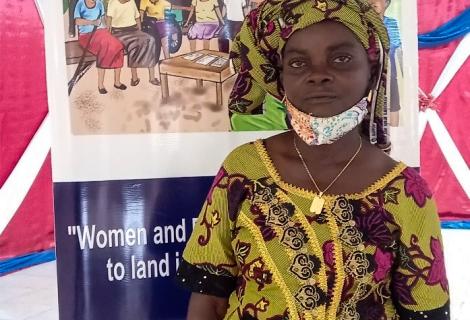Women’s rights training empowers rural women to claim their land right

Knowledge is Power!!
The EU co-funded project being implemented by ActionAid Liberia in partnership with Development Education Network – Liberia (DEN-L) and ForumCiv focus on women and communities with knowledge and information on their land rights. The story of women and property ownership in Liberia especially in rural communities is an age-old struggle that had achieved very little until the passing of the Land Rights Act in 2018. Women had continued to play a peripheral role in land governance and management especially women in rural communities due to the unavailability of clarity of policies and laws as well as the entrenchment of a combination of cultural and traditional practices benchmarked by a largely patriarchal society. However, even with the passing of the Land Rights Act of 2019, this did not translate into an increase in women's land ownership and control patterns, nor did it immediately change the attitude of men, traditions, and culture towards women’s access and control over land.
Women’s land rights is a struggle that requires more than just a legal framework but sustained awareness creation and sensitization to build the knowledge and confidence of women to challenge and claim for their own rights. 54 years old Annie Wollo from Tuobo Gbaweleken Community in River Gee is one of the beneficiaries of the project that is being implemented by ActionAid and partners co-financed by the European Delegation in Liberia. She is one of the women who was selected to participate in women’s rights and women’s land rights training including provisions of the LRA of 2018. She is married and in all her life she had never known that she has equal rights just to her husband including rights to land ownership and control. Annie says before being selected to attend the training she did not have adequate knowledge about women’s rights to land.
Before I attended the trainings organized by ActionAid on women’s rights to land, I did not think that as a woman I had any right. All I knew was that my husband owned everything including me because he paid dowry for me and that I could only own land or property through him. This is why I never bothered to discuss with him about my won rights as a woman,” says Annie.
Due to the deeply entrenched patriarchy in River Gee, talking about women’s rights was seen as disobedience to customs, tradition, and one’s own family and husband, but after the training, many women in Annie’s position started talking about their rights and engaging their families. The women’s rights training was also open to men and traditional leaders. The training has impacted some of the men in Annie’s community and they are also now championing women’s rights especially access to land. While control over land is still partial and largely in the hands of male counterparts, it is expected that with continuous engagements women will have both access and full control over land. Annie believes that there is strength in numbers and if more women stand up for their rights, land ownership and control patterns will change in their favor as she added below;
I believe these baby steps on our claim to land rights will be fruitful if all women gather courage and work together in communities to engage the traditional leaders, husbands, and clan leaders on their rights. As for me, I now have a group of over 50 women I work with and we discuss about land business when we meet for our ‘susu clubs.’ I know one day we will own our own land because of the information that we received from ActionAid,” added Annie.
‘Susu clubs’ are exclusive women groups involved in savings and lending. In these spaces, women are free to talk about issues that affect them and are safe spaces where they can share ideas without any prejudice from men.
Annie is also part of the Project Advisory Group (PAG) which is an accountability structure set up to ensure that the project beneficiaries and stakeholders at the local level provide continuous feedback on interventions. The PAG has enabled AAL and partners to incorporate learnings and best practices for the interventions in the three project counties.
About the Project
This project focuses on empowering women and communities to secure their land rights and also promotes young people’s engagement in land governance processes at the community level. The first year of the project focused on creating awareness and setting up structures for the project. The second year will have a specific focus on the land formalization process, especially the community self-identification process.
Disclaimer: The contents of this publication and opinions expressed do not in any way reflect the views of the European Union Delegation in Liberia but rather of the individuals quoted and the partners to this action.